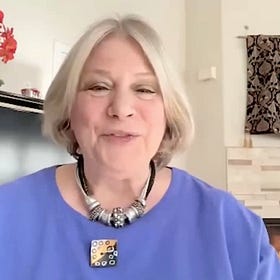Our connections with nature and others are an important part of who we are
Connections help understand different parts of ourselves
"I really love my own time with myself. It's a hugely important part of my life. But then equally are the connections that I make."
Willow McIntosh continues:
"And I think sometimes, whether it is a connection with an animal or with another person or, or with nature in some way, I think the depth of connections that we have and the depth of friendships that we make is a very important part of who we are.
"There's almost something in the exploration and in the interconnection...a way into understanding different parts of ourselves."
He adds, "And I think that's a great part for us as HSPs [highly sensitive person] to, to have that depth of connection because of what we can see in each other and what we can kind of explore and how we can understand our own selves better and how we can understand the world better by being able to use that reflection in the other person to understand ourselves more."
From episode 193: Being Ourselves in the World with Julie and Willow of the HSP and Neurodivergent Podcast.
Here is a brief excerpt from the video version:
From the Show Notes:
"Julie and Willow discuss the challenges of planning and traveling, the importance of trust and presence, and their love for animals and nature. In this conversation, Julie and Willow discuss the joy of observing sea creatures and the importance of deep connections.
“They share personal stories of friendship and the freedom of being authentic. They also emphasize the significance of embracing one's unique identity, especially during Pride Month."
Follow link to the podcast section of the Sensitive Empowerment site of Julie Bjelland, where you can find many more articles, books, courses, Sensitive Community and other resources.
About the Hosts
"I’m Julie Bjelland, LMFT, a Licensed Psychotherapist, author, and founder of Sensitive Empowerment, specializing in high sensitivity and adult-diagnosed autism in women. I love developing tools that balance our sensitive nervous system, reduce challenges, and help us reach our fullest potential so we may excel in our unique talents."
Willow McIntosh is "the founder of Inluminance and specialises in initiating people with High Sensory Intelligence to experience their reality as a gift that can be implemented into valuable products and services."
Learn about his program Identity Journey for HSPs and High Sensory People - a "process that utilises a method developed from thousands of hours of facilitating HSPs that will allow you to reveal and experience the truth of your natural abilities, purpose, and true identity."
~~~
Setting boundaries
Therapist Julie Bjelland notes "Highly sensitive people (HSPs) are often over-givers. We think it is kind to give so much, but actually, it can be unhealthy.
"I’ve worked with HSPs all over the world and one thing that comes up the most is how much resentment comes up when you feel you have been so giving but are not getting back what you put in."
She finds "The process of setting boundaries takes time, and it will not always be comfortable. As HSPs, this process can seem counterintuitive to who we are. After all, we want to help others.
"Like with so many of our strengths, they cannot remain our strengths if we don’t also set boundaries that allow us to remain empowered and be our best selves."
She warns that "Without boundaries, we suffer from depletion and often feel resentment in our relationships, which is ultimately damaging for everyone. Setting healthy boundaries improves our lives and our relationships both personally and professionally."
From her free webinar "How to Set Healthy Boundaries as an HSP and Improve Your Relationships" - see list of Webinars for the Sensitive & Neurodivergent.
~~~~
The images at top are from the information page for the online course "Grow Your Heart-Centered Business" - see list of Courses for the Sensitive and Neurodiverse by therapist Julie Bjelland, LMFT.
~~~~
Other issues that can affect how easily of how well we develop healthy relationships are attachment styles, and attachment wounding - both in childhood and as an adult.
Related posts:
Healthy relationships and attachment styles with Aimie Apigian, MD
"Attachment is not just one’s relationship style, it was one’s survival style for the first few years of life. “These experiences influence our attachment styles—secure, anxious, avoidant, or disorganized—and shape our ability to form healthy relationships."
How attachment styles and trauma impact our relationships - with Dr Diane Poole Heller
Diane Poole Heller Ph.D. is "an internationally recognized speaker, author, and expert in the field of child and adult attachment theory as well as trauma resolution." The first part (about 2 min) of this audio is an intro for her online course Healing Your Attachment Wounds
ø ø ø






